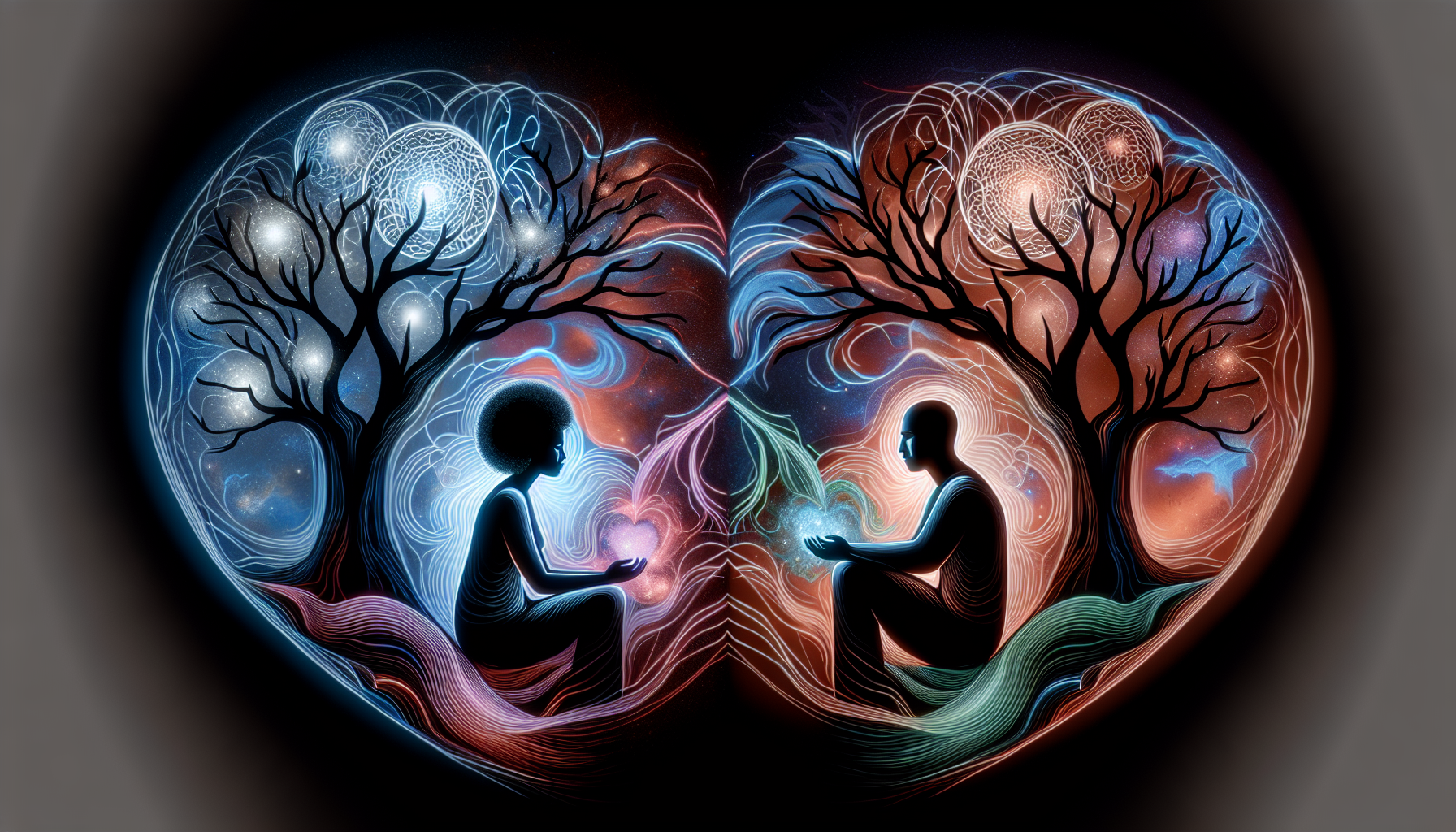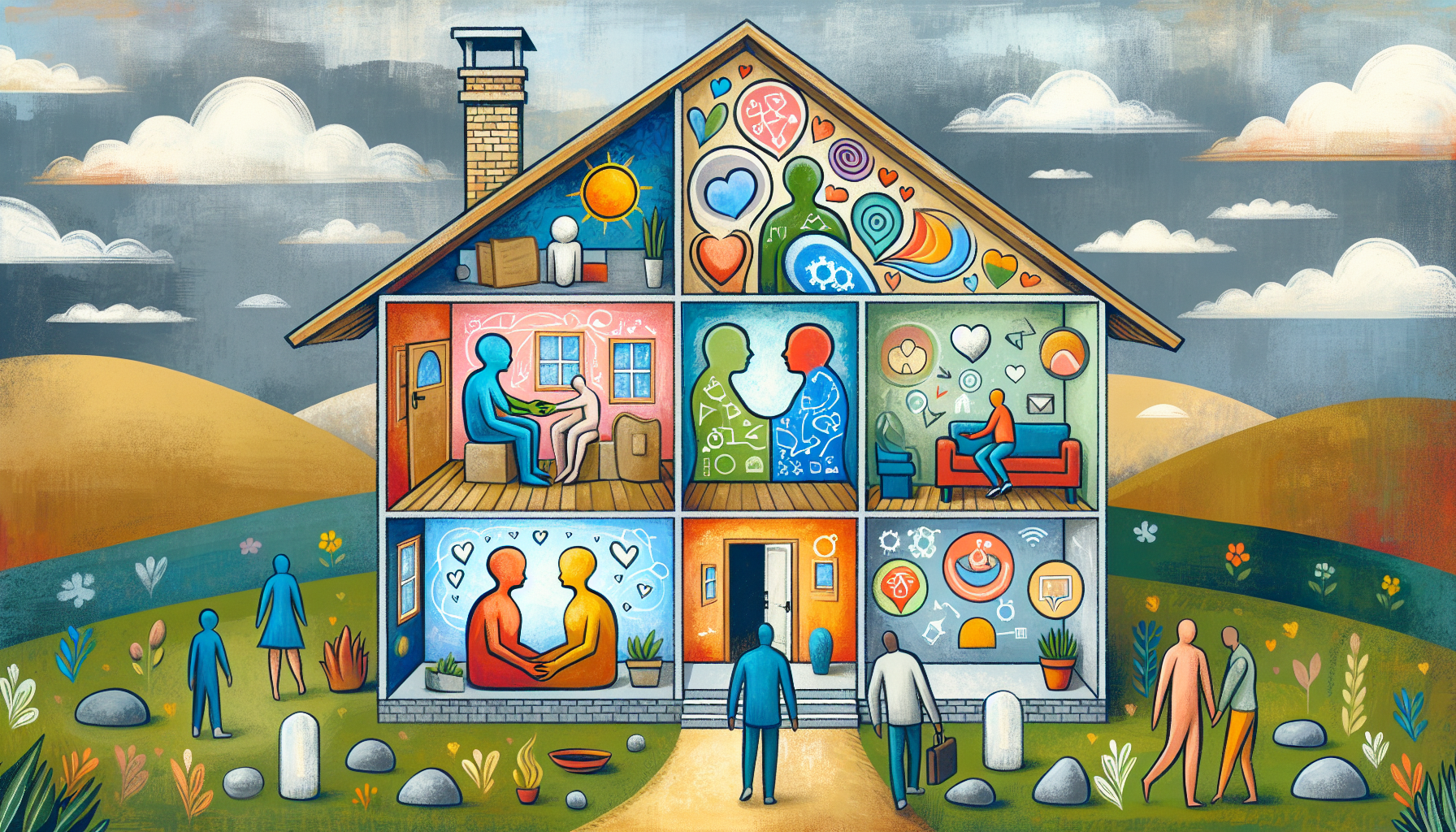What kind of therapy is best for couples?

Navigating the complexities of a relationship can often require professional guidance, and choosing the right therapy is crucial. This article, titled “What Kind of Therapy Is Best for Couples,” explores various effective therapy methods, including Emotionally Focused Therapy, PACT, and the Gottman Method, each offering unique approaches to strengthening partnerships.
Our goal is to assist you in identifying the therapy that best aligns with your relationship’s specific challenges and dynamics. From improving communication to rekindling emotional connections, this guide is dedicated to helping couples find a path to a healthier, more fulfilling partnership.
Key Takeaways
1. Diverse Techniques: Couples therapy includes various methods tailored to different relationship needs, enhancing communication and intimacy.
2. Specialized Methods: PACT, The Gottman Method, and EFT offer specific strategies for more robust, more secure relationships.
3. Personalized Selection: Effective therapy choice depends on aligning with each partner’s needs, relationship challenges, and shared goals.
Introduction to Couples Therapy

Think of couples therapy as a caring guide on your relationship journey. Each therapy type is a different path designed to mend or enhance specific aspects of your bond. Knowing which tool to reach for at the right moment is vital to nurturing your relationship.
Let’s embark on a journey to explore the different avenues of couples therapy, each inviting us to a deeper understanding and connection. Together, we’ll discover the therapy approach that resonates most authentically with your relationship’s unique rhythm.
Watch Sophie & Jesse’s Free Webinar NOW : From Conflicts to Deeper Connections
The Role of Therapy in Strengthening Relationships
Consider a bridge that connects two individuals in a relationship. This bridge is built and strengthened through effective communication, conflict resolution, and intimacy fostering. Therapy serves as an architect, guiding couples in constructing and maintaining this bridge.
It facilitates the discovery of each partner’s emotional needs and equips couples with effective communication strategies, such as mirroring and the Imago Dialogue, to meet these needs.
Therapy also helps identify sources of conflict and develop skills to address negative behaviors. But the architecture of this bridge doesn’t stop there. Imagine a journey where you and your partner uncover the depths of each other’s emotional worlds.
As relationship expert Sophie Parienti says, “It’s about learning the language of your partner’s heart.” Therapy isn’t just about navigating challenges; it’s about equipping you with heartfelt communication strategies, like the gentle art of mirroring and the nurturing practice of Imago Dialogue.
Together, these tools help you understand and beautifully meet each other’s emotional needs, fostering a deeper, more connected relationship.
Understanding Different Therapy Techniques
Every relationship is a beautiful, one-of-a-kind tapestry, as are the therapy techniques crafted to support them. These approaches are as diverse as the stars in the sky, each tailored to fit your partnership’s unique challenges and aspirations.
The choice of technique is a thoughtful dance between your relationship’s specific needs, the goals you both cherish, and the therapist’s expertise.
It’s about finding that perfect harmony, a therapy approach that resonates with the melody of your hearts and the values you hold dear together
For instance, while techniques such as:
- Reflective listening focuses on active listening and understanding
- Emotion-focused therapy aims to improve emotional connection.
- Narrative therapy explores the narratives shaping the relationship.
- Solution-focused therapy centers on solutions and goal-setting
- Cognitive-behavioral therapy (CBT) addresses thought patterns contributing to conflicts
Understanding these varying techniques can help couples find the best fit for their unique relationship dynamics.
PACT Therapy – A Journey to Deeper Connection

Envision a therapy technique that melds the principles of neuroscience, attachment theory, and arousal regulation. This is PACT (Psychobiological Approach to Couple Therapy).
PACT therapy integrates these principles to address complex relationship challenges. It uses insights from neuroscience to assist couples in forming a secure romantic attachment, thus reducing conflict and enhancing their connection.
Moreover, PACT introduces the soothing practices of auto-regulation and mindfulness, guiding you in managing your responses to each other with grace and understanding.
Key Principles of PACT Therapy
At the core of PACT therapy is the concept of secure functioning. Picture this as a sanctuary where mutual collaboration, justice, and fairness are the pillars.
In this system, you and your partner strive for secure attachment while acknowledging the impact of their attachment styles and psychobiological makeup on their interactions.
Arousal regulation is another essential component involving effective management and control of emotions and arousal levels within couples.
PACT therapy incorporates these principles by encouraging focused attention to micro-expressions and other interaction details during therapy sessions.
How PACT Therapy Supports Couples
PACT therapy acts as a compass, guiding couples toward:
- Better understanding and management of their emotional responses
- Improved communication by fostering a better understanding of each partner’s needs, acknowledging past experiences, and identifying essential aspects to create a deeper connection
- We are equipping couples with resources for expedited conflict resolution and reduction of relationship distress.
PACT therapy is a guiding light toward secure-functioning relationships, where trust, understanding, and emotional connection are the cornerstones of your love story.
Imago Relationship Therapy – Healing Together

Imago Relationship Therapy invites couples on a transformative journey to understand how childhood experiences subtly shape adult relationships.
Developed by the insightful minds of Harville Hendrix, PhD, and Helen LaKelly Hunt, PhD, in the 1970s, Imago therapy is a beacon of hope, illuminating the path to a deeper, more fulfilling partnership.
This therapy weaves together principles that nurture the heart of your relationship:
- Banishing Negative Language: Imago therapy fosters a language of love and respect, replacing hurtful words with expressions that heal and unite.
- Creating a Safe Emotional Space: It’s about building a haven where both partners can freely and safely express their deepest emotions and vulnerabilities.
- Reviving Romance: Imago breathes new life into the romantic essence of your relationship, rekindling the flames of love and affection.
- Cultivating Active Listening and Empathy: This therapy emphasizes truly hearing and empathizing with each other, fostering a deeper understanding and connection.
The Concept Behind Imago Relationship Therapy
The essence of Imago Relationship Therapy lies in a fascinating revelation: We often gravitate toward partners who mirror the traits of our childhood caregivers.
This subconscious phenomenon, known as ‘Imago,’ reflects an ingrained image of an ideal caregiver, often shaped during our earliest years. It’s like an invisible thread connecting the care we receive as children to the love we seek as adults.
Join Sophie and Jesse’s Free Webinar : From Conflicts to Deeper Connection February 29th
The Imago theory suggests that these subconscious choices echo through our adult relationships, repeating certain patterns and shaping how we connect with our partners.
Bring Imago Therapy to Life
In practice, Imago therapy helps couples by:
- Identifying and addressing patterns through structured dialogues and exercises
- Assisting couples in managing their emotional responses
- Fostering a better understanding of each other’s needs
- Promoting more effective communication
These methods can significantly improve the dynamics and overall satisfaction in a relationship.
It also provides resources such as maintaining a friendly demeanor in body language, touch, words, and tone, contributing to expedited conflict resolution and reduced relationship distress.
These resources pave the way for quicker conflict resolution and lessen relationship distress. By addressing trust issues with body-based methods, Imago therapy gently steers your relationship toward a secure, loving, and understanding future.
The Gottman Method – A Path to Deeper Connection

Welcome to the world of the Gottman Method, a research-backed approach that enriches relationships by deepening empathy, enhancing communication, and nurturing intimacy. Rooted in the Sound Relationship House Theory, this method is the brainchild of Drs. John and Julie Gottman.
It’s like a compass for relationships, guiding you to understand and mirror each other’s feelings, ensuring that every emotion is heard, truly felt, and shared.
The Gottman Method isn’t just about talking; it’s about connecting. It uses specific tools and techniques that transform the way couples communicate. Let’s delve into the core principles of this method and how it weaves magic in couples therapy.
Foundations of The Gottman Method
At its heart, the Gottman Method is built on nine critical components, each a stepping stone to a fulfilling romantic relationship. These include:
- Building Love Maps: Understand the rich landscape of your partner’s world, creating a solid base for friendship and connection.
- Softening Conversations: Learn the art of easing into discussions, setting a tone of understanding and care.
- Repair Attempts: Master the skill of sending and receiving signals that mend and heal, bridging gaps in your communication.
- Soothing Techniques: Discover ways to calm yourself and your partner, creating a peaceful environment for love to grow.
These principles aren’t just guidelines; they’re pathways to a deeper emotional connection and intimacy, enhancing your friendship and bonding and transforming your relationship positively.
Application and Benefits of The Gottman Method
The Gottman Method supports couples by:
- Helping them understand and manage their emotional responses
- Leading to healthier communication and conflict resolution
- Enhancing communication between couples by cultivating empathy
- Promoting a deeper understanding of each other’s thoughts and feelings
- Instructing effective communication skills
Moreover, the Gottman Method empowers you to effectively address conflict and build stronger relationships through promoting closeness, improving friendship behaviors, and cultivating healthy relationship and conflict management skills.
The application process of the Gottman Method commences with an assessment to determine the therapeutic approach, followed by extensive assessment form a joint session between the couple and the family therapist to establish a framework for intervention.
Emotionally Focused Therapy (EFT) – Nurturing Heartfelt Connection

We’ll now turn our attention to Emotionally Focused Couples Therapy (EFCT), a short-term therapy that aims to create secure attachments and improve emotional bonding between partners.
EFCT, also known as Emotionally Focused Therapy (EFT), is rooted in attachment theory, highlighting the significance of emotions in self-construction and self-organization.
Join Sophie and Jesse’s Free Webinar : From Conflicts to Deeper Connection February 29th
This therapy involves a series of procedures that aim to expand and re-organize the emotional responses of the couple, addressing negative interaction patterns that impede emotional connection.
It is more than just therapy; it’s a journey towards a more secure and resilient bond, fostering stronger relationships and enhancing communication.
Understanding Emotionally Focused Therapy
EFT is like a guiding light, leading couples through:
- Identifying and changing maladaptive patterns of interaction that interfere with emotional connection
- Transforming negative beliefs and interpretations
- Addressing issues through alternative stories
- Distinguishing individuals from their problems
- Leveraging strengths to address challenges
This therapeutic approach aids those who seek therapy in transforming negative beliefs and interpretations, addressing issues through alternative stories, distinguishing individuals from their problems, and leveraging strengths to address challenges.
It also focuses on developing emotional closeness, encouraging acceptance, empathetic connection, unified detachment, and fostering tolerance within the relationship dynamic.
Efficacy of EFT in Couples Therapy
EFT has shown remarkable effectiveness in enhancing relationship satisfaction, increasing intimacy, and deepening the bond between partners.
It addresses the complexities of life and relationships by acknowledging the intricate web of human emotions and needs. By focusing on these emotional aspects of failing relationship, EFT offers profound benefits for both individuals and couples.
The effectiveness of the EFT model is well-documented in research, highlighting its promise as a therapeutic approach for couples eager to enrich their relationship. It’s not just about solving problems; it’s about weaving a stronger, more loving bond.
Discernment Counseling – Navigating Relationship Crossroads
Discernment counseling is a brief intervention designed for conflicted couples who are unsure whether to continue or end their relationship.
This type of counseling assists clients grappling with ambivalence about divorce and aims to help you make a considered, well-informed decision about your relationship’s future.
Discernment counseling offers a form of couples counseling that provides:
- A structured and supportive environment
- Insight into their roles in the relationship’s challenges
- Consideration of different resolutions
- Tackling underlying issues
- Making a well-informed choice about the future of their relationship
We’ll examine the process and purpose of discernment counseling and determine when it’s most appropriate.
The Process and Purpose of Discernment Counseling
Many therapists can liken discernment counseling to a compass, guiding conflicted couples toward a clearer understanding of their relationship’s future.
This counseling method offers guidance to couples considering divorce and helps them make a definitive decision about their relationship’s future.
It evaluates the potential resolution of relationship issues, gauges the couple’s commitment to improving the relationship, and aids couples in determining the subsequent course of action in their relationship.
The process of marriage counseling involves the following:
- Extensive evaluation of the marriage
- In-depth discussions about the possible reasons for divorce
- The use of specific questions helps couples gain clarity and insight into their relationship dynamics.
When to Choose Discernment Counseling
Discernment counseling is best suited for couples who are uncertain about their relationship’s future. Both partners’ active participation and engagement are essential in the Discernment Counseling process.
Join Sophie and Jesse’s Free Webinar : From Conflicts to Deeper Connection February 29th
However, it’s important to note that in situations involving domestic violence or substance abuse, discernment counseling might not be safe or effective, suggesting the need for alternative therapeutic approaches.
In these moments, discernment counseling acts as a gentle guide, helping couples find clarity and confidence in their decision about their relationship’s path.
The Developmental Model of Couples Therapy – Guiding Relationships Through Growth
The Developmental Model of Couples Therapy addresses relationship issues by examining the stages of relationship development and the challenges that arise at each stage.
Developed by Ellyn Bader and Peter Pearson, this model acknowledges that relationships evolve and change over time.
Exploring The Developmental Model
The Developmental Model focuses on helping couples navigate the natural progression of their relationship and overcome obstacles that may hinder growth.
The model identifies specific developmental phases that romantic relationships pass through, assisting couples in managing the distinct challenges that emerge at each stage of their relationship.
Suitability and Effectiveness of The Developmental Model
The beauty of the Developmental Model lies in its universal applicability. It resonates with couples at any relationship stage, whether in the honeymoon phase or decades into their partnership.
Take Sarah and Alex, who initially struggled to balance independence and togetherness in their relationship’s early days. The Developmental Model offered them insights and strategies suitable for their stage, helping them harmonize their lives.
As years passed and their relationship deepened, the model continued to guide them through more complex challenges.
It helped them understand how their emotions and thoughts shaped their interactions, turning potential conflicts into opportunities for growth and stronger connections.
This example shows how the Developmental Model adapts to each relationship stage, fostering lasting satisfaction and stability. It’s a testament to its effectiveness in nurturing and guiding couples through their evolving journey together.
Narrative Therapy Essentials of Narrative Therapy – Rewrite Your Relationship Story
Narrative Therapy offers a refreshing and empowering approach to couples therapy. It focuses on reshaping the stories couples tell about their relationships.
This approach encourages couples to author their own narratives, fostering new, healthier narratives, communication, and collaboration. It’s about recognizing each partner’s strengths and empowering them to be the protagonists in their shared life story.
Implementing Narrative Therapy in Relationships
At the heart of Narrative Therapy is the concept of separating relationship issues from personal identities. This perspective allows couples to address problems more objectively, transforming how they understand and interact with each other. The therapy employs several key techniques:
- Externalization
- Story development
- Alternative story-telling
- Challenging unhealthy beliefs
- Exploration of unique outcomes
It facilitates problem-solving in relationship conflicts by:
- Assisting clients in transforming negative beliefs and interpretations
- Addressing issues through alternative stories
- Distinguishing individuals from their problems
- Leveraging strengths to address challenges.
Solution-Focused Brief Therapy- A Direct Path to Solutions
Solution-Focused Brief Therapy is a goal-oriented approach that helps couples address specific issues and work towards short-term solutions.
This therapy model emphasizes creating solutions rather than problem-solving and employs a strength-based, goal-focused methodology. It involves a structured approach, starting with discussing the client’s goals and then identifying their strengths, resources, and past successes.
We’ll examine the principles of Solution-Focused Brief Therapy and its benefits for couples.
Advantages of Solution-Focused Brief Therapy for Couples
Solution-Focused Brief Therapy is ideal for couples who want to focus on resolving particular problems rather than exploring deeper emotional issues. This therapy model is favored for its ability to effectively stimulate constructive conversations and deliver quicker treatment outcomes compared to other therapy methods.
Join Sophie and Jesse’s Free Webinar : From Conflicts to Deeper Connection February 29th
Overall, Solution-Focused Brief Therapy offers a practical, results-oriented approach, ideal for couples seeking to swiftly navigate their relationship hurdles and foster a more harmonious bond.
Cognitive Behavioral Couple Therapy – Reframing Thoughts for a Stronger Bond
Cognitive Behavioral Couple Therapy (CBCT) examines thought patterns and behaviors to improve communication and resolve relationship conflicts. Based on principles from social learning theories, it emphasizes acceptance and change as positive outcomes in couples’ interactions.
This therapy model offers a comprehensive approach to addressing various relationship stressors and has been established as a highly effective intervention.
Assessing the Impact of Cognitive Behavioral Couple Therapy
CBCT is effective in addressing a wide range of relationship issues, including:
- severe cases and complex dynamics
- bonding and enactments
- cognitive restructuring
- guided discovery
- exposure therapy
- journaling
These techniques facilitate discussions about emotions, rectify negative thought patterns, introduce new viewpoints, address fears or anxieties, and promote introspection on thoughts and behaviors.
CBCT is particularly effective in guiding discussions about emotions and thought patterns. It helps couples identify and rectify negative thinking, fostering new, constructive perspectives.
Integrative Behavioral Couple Therapy – A Harmonious Blend for Lasting Love
Integrative Behavioral Couple Therapy (IBCT) combines elements of other therapy approaches to address each couple’s unique needs. It extends traditional behavioral theories of couple distress and intervention by emphasizing acceptance and change as positive outcomes. This therapy model integrates the following:
- Traditional behavioral couple therapy
- Mindfulness techniques
- Acceptance-based techniques
- Compassion-based techniques
All these elements come together to address the distinctive needs of couples.
How Integrative Behavioral Couple Therapy Works
IBCT focuses on both acceptance and change, helping couples develop skills to meet each other’s needs and create a more harmonious relationship. It emphasizes:
- Coregulation of emotions between partners
- Cultivating love, commitment, and mutual engagement
- Thorough analysis of relationship issues
- Disruption of negative interaction patterns
- Cultivation of emotional closeness
- Encouragement of acceptance
- Empathetic connection
- Unified detachment
- Fostering tolerance within the relationship dynamic
Conclusion
Navigating through the diverse landscape of couples therapy techniques unveils many tools intended to repair, strengthen, and enrich relationships. Each method, be it PACT therapy’s focus on neurobiology and attachment or the Gottman Method’s research-based approach to enhancing empathy increase intimacy, and communication, presents a unique pathway to relationship enhancement.
Grasping these techniques can assist couples in steering through the intricacies of their relationships, cultivating stronger bonds and profound connections.
Final Thoughts on Selecting the Right Therapy
Selecting the proper therapy technique requires deeply understanding your relationship’s unique challenges and aspirations. It’s about discovering the perfect tool to mend the specific fractures in your relationship bridge.
Couples therapy offers a rich tapestry of techniques designed to address every relationship’s unique needs and challenges. Whether it’s the strength-based approach of Solution-Focused Brief Therapy or the exploration of unconscious influences in Imago Relationship Therapy, each technique brings its unique strengths.
Remember, therapy isn’t one-size-fits-all. Be open to exploring various approaches, and keep in mind that the path to a healthier, more fulfilling relationship is a journey, not a destination.
Also Read >>7 advice to inspire your partner to go to couple’s therapy – YOGI TIMES
FAQs
Emotionally focused therapy has proven to have the highest success rate of any couples counseling method.
Couples therapy often uses Emotionally Focused Therapy (EFT), which focuses on improving the attachment and bonding between partners by helping them understand and change patterns that lead to feelings of disconnection.
The downside of couples therapy is that both partners need to take responsibility for their role in the problems, and it can be a costly and time-consuming process.
Couples therapy has a success rate of roughly 70%, with about 50% of married couples having attended marriage counseling. By seeking help from a qualified couples therapist together, couples can significantly improve their relationships.
Couples therapy enhances relationships by facilitating improved communication, conflict resolution, increased intimacy, and identifying and addressing unhealthy patterns. It helps couples build stronger and healthier relationships.
Discover >>The online course for positive conflict resolution called
Sales Page | YOGI TIMES University (teachable.com)




